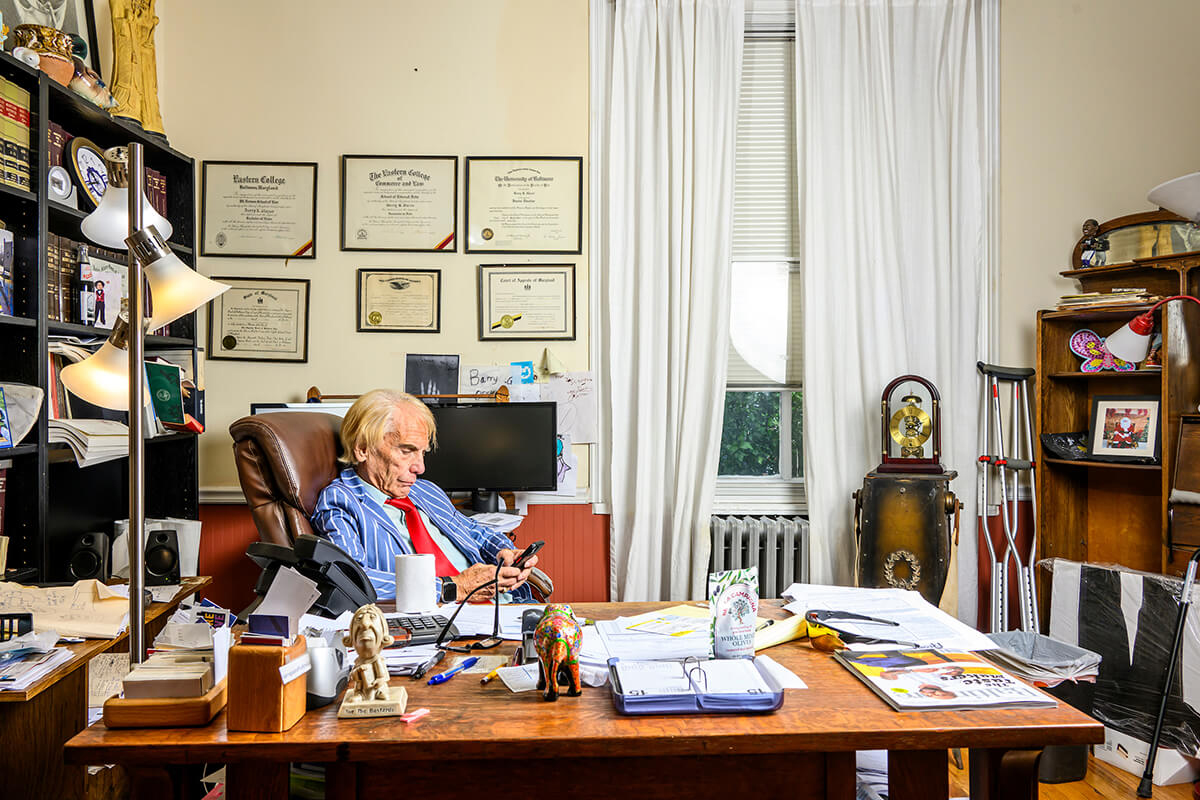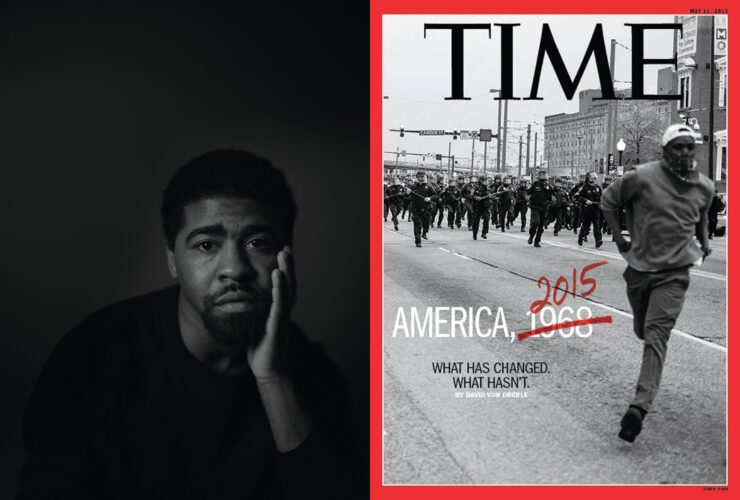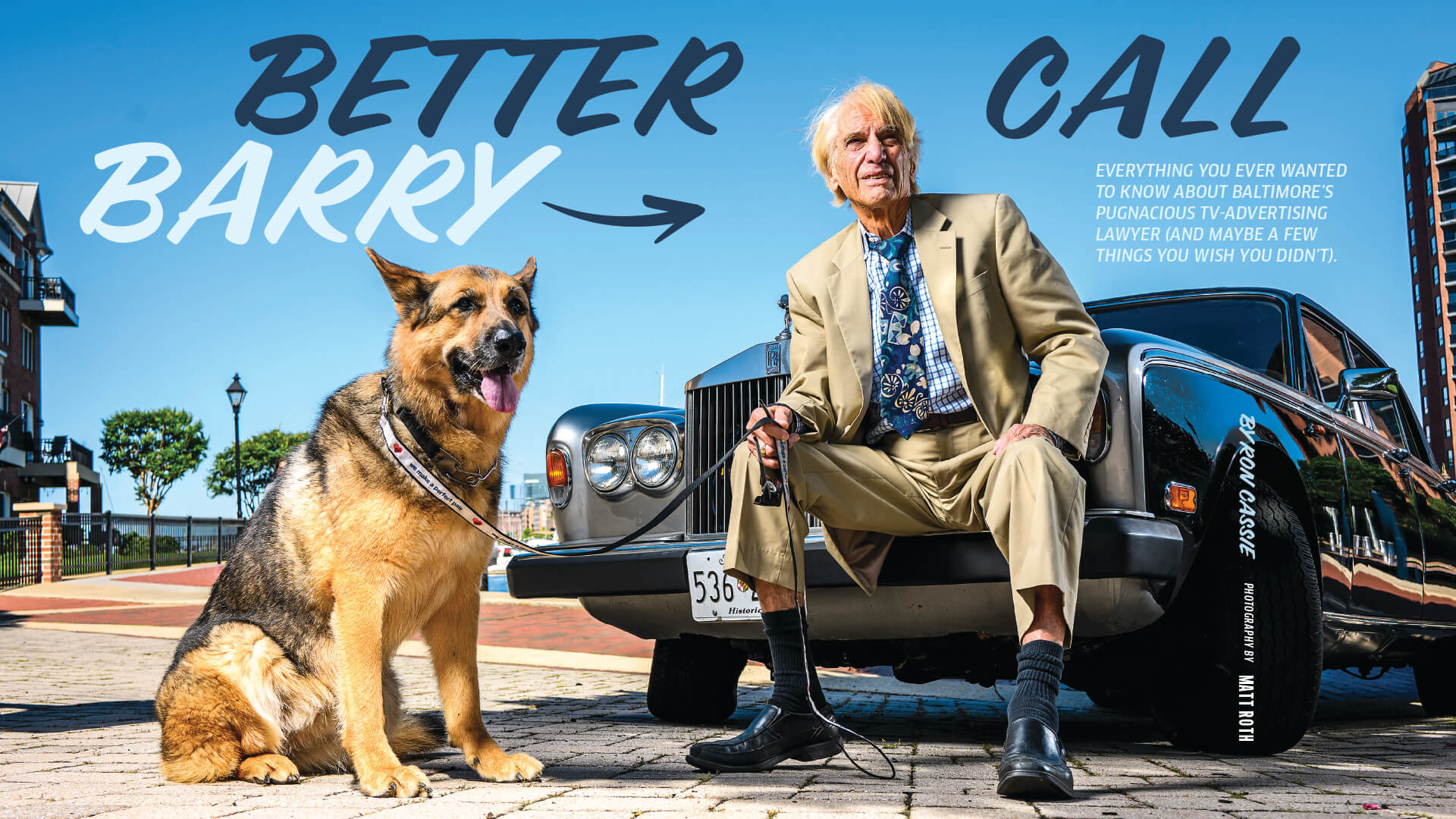
News & Community
Better Call Barry
Everything you ever wanted to know about Baltimore’s pugnacious TV-advertising lawyer (and maybe a few things you wish you didn’t).
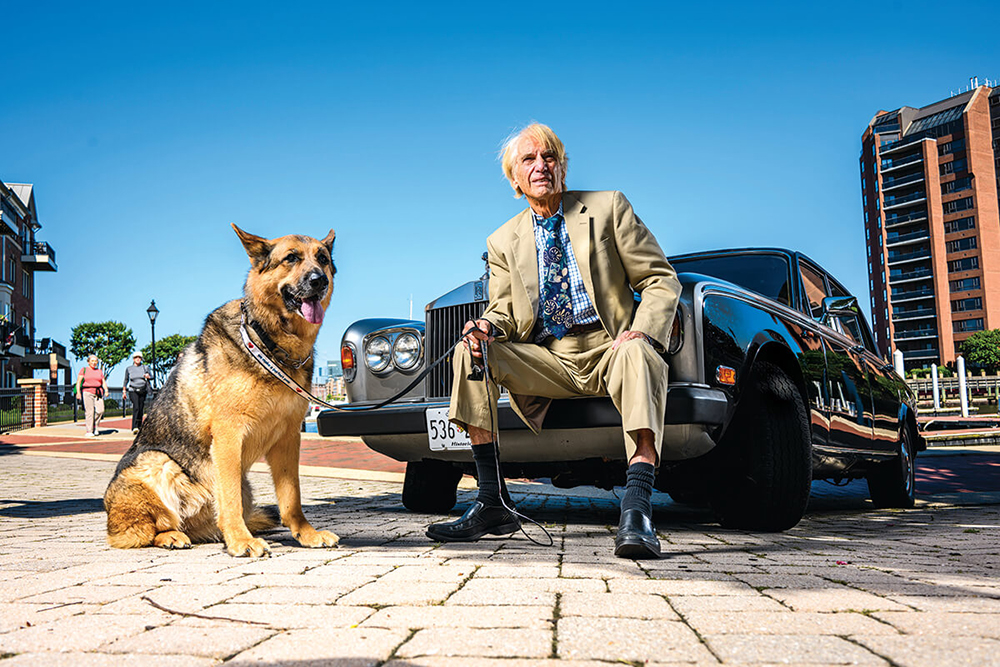
By Ron Cassie
Photography by Matt Roth
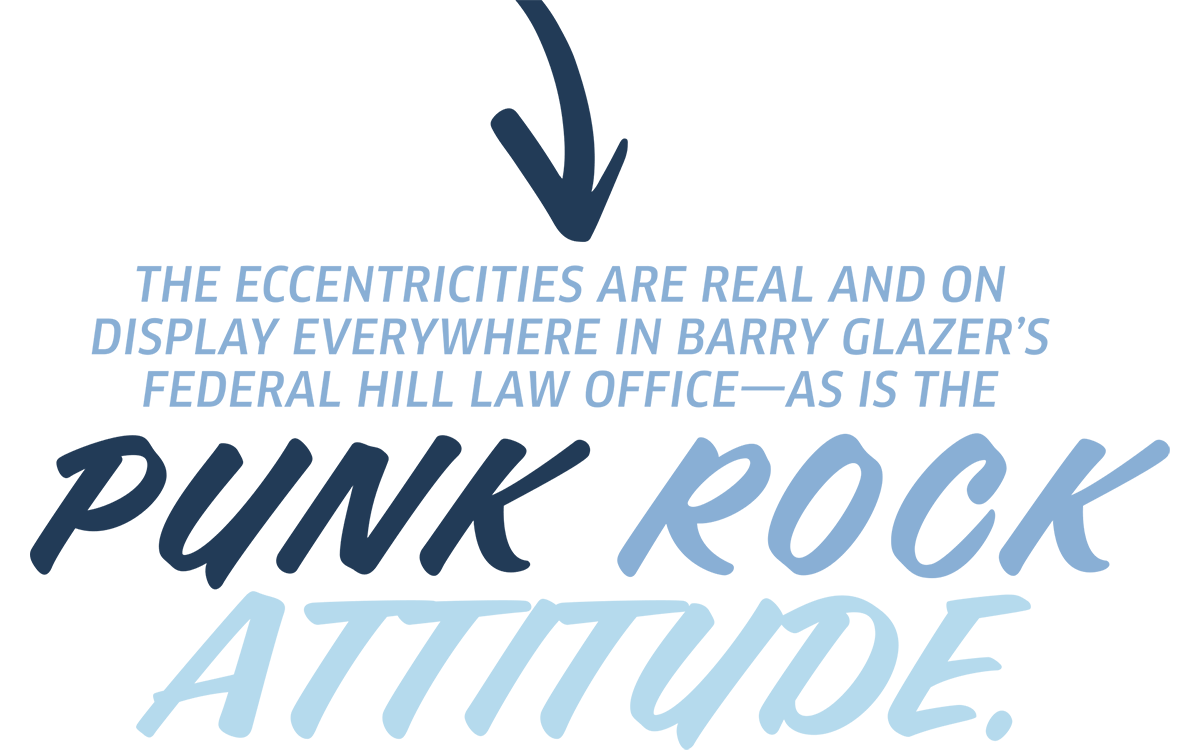
A sprawling converted one-time Quaker meetinghouse (of all things), the office includes an anti-British monarchy “museum” off the lobby with a glass-encased bicycle formerly belonging to Princess Diana, which he randomly bought online for $80,000 and then dropped another $20,000 on to ship from the U.K. to South Baltimore. The bicycle, the room’s centerpiece, is surrounded by life-size cutouts of the Royal Family saying things like, “My baby’s bloodline is better than yours” and “Come here little girl, I have candy”—a shot at Prince Andrew’s Jeffrey Epstein problem.
There is a full basketball court upstairs—and cathedral ceiling—where Glazer occasionally roller-skates when he’s feeling spry. And a drum kit on the third floor, which he pounds on to blow off steam. There is the duck that he keeps in the courtyard for company, along with a chicken that provides fresh brown eggs. And then there is his elliptical machine, which gets vigorous use, and a commercial juicer in the kitchen because, on top of everything else, Baltimore’s most notorious and beloved TV-advertising lawyer turns out to be an animal lover and a health-food nut who doesn't drink but once in a blue moon.
To say the man contains multitudes is an understatement.
We’ll get to the divorce, the dating apps, and the marijuana lying around his gated Canton waterfront home later, because you can’t write a profile of Barry Glazer—whatever the varied contradictory impulses that animate him—and not start with his television commercials.
His signature umbrella, dog, and catchphrase—“Don’t Urinate on My Leg and Tell Me It’s Raining”—are seared into this city’s collective image bank, right alongside pink flamingoes, crabs, Edgar Allan Poe, and The Wire.
For four decades, Baltimore’s OG personal-injury lawyer has been filling our airwaves with in-your-face, occasionally censored ads that are so undeniably bad, they’re good. They are the TV-commercial equivalent of that annoying song you don’t like but can’t get out of your head once you’ve heard it. But people talk about them and him.
You’re angry about being screwed by your insurance company? He’s angry, too. More than you, in fact. About everything. He’s going to fight for you, the little guy. They’re urinating on you, and it pisses him off.
“I’ve been making television commercials longer than any attorney in the country,” the still-scrappy, self-made Pimlico native says proudly, standing in the hallway just inside his front door as his polite and disarmingly professional office manager fields another call. “At least that I know of.”
Opening Spread: Barry Glazer in front of his Rolls Royce with his German shepherd, Greta, near his
Canton waterfront home.
By now, it should surprise no one that the star of the grating ads, the 79-year-old banty rooster with the bleached comb-over and Billy Idol sneer, writes each 30-second rant himself.
If you have the general feeling that Glazer and the ads have become more outrageous and flamboyant over the years, you wouldn’t be wrong. The blond hair, the bright blue contact lenses, the thick gold chain, the loud wardrobe and Miami tan (no tanning beds for Glazer; the UV radiation freaks him out), not to mention the grievances, both petty and grand, have all been dialed up in recent years. The down and dirty SNL-style sketches—the surgeon holding up a mistakenly removed liver in the OR, the stomping of a national insurer’s little green mascot, the tirade against corporate greed with his Rolls Royce and Maserati in the background—they’re still ripped from the headlines and the singular product of Glazer’s fevered dreams.
Basically, the ad process begins like this: Every four to six months, or whenever an idea pops to mind, he reaches out to his longtime collaborator, local filmmaker Jimmy Lingg. News of a heart surgeon who has been charged with placing unnecessary stents, a fresh nursing-home scandal, a prostitution bust offending his libertarian sensibilities—more on that later, too—inevitably get the creative juices flowing.
“I put a couple of sentences down on a legal pad and call Jimmy,” says Glazer, who is, thank God, way more laidback and soft-spoken in person than his embittered pitchman persona suggests and good company off camera. “Or I’ll just text him my idea when I’ve got something to say.”
The hospital and operating rooms scenes? They’re conveniently set in the veterinary hospital he owns, along with a doggy daycare, where his super-friendly German shepherd, Greta, spends her days, and kennel business in South Baltimore. (He really does love animals and recoiled at the sight of a dead mouse in a trap outside a residential block in Federal Hill as we walked back to his office.) The background actors in his commercials work at the vet hospital or his law firm. They get a kick out of them.
He’s got built-in sets and a cast, but not all his ideas pan out.
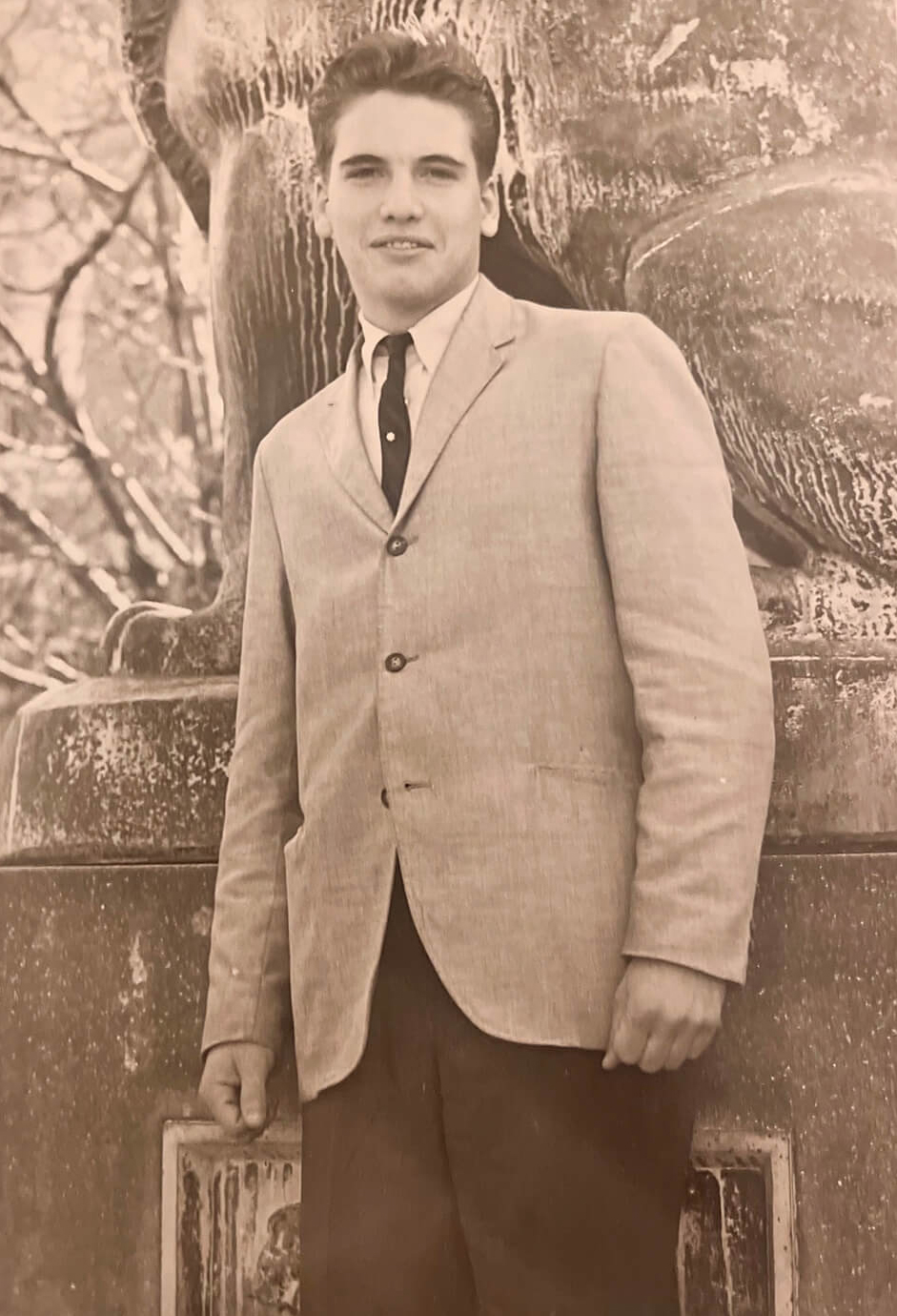
Barry as a young man.
During COVID, he desperately wanted to do a bit around people getting injured while working from home.
“He wanted to turn his bathroom into an office, fill it with a desk, computer, and phone, and then have the ceiling collapse while someone was sitting on the toilet,” recalls Lingg, who otherwise makes a living documenting client interviews and testimonies for law firms. With Glazer, he brings a sense of adventure and humor, requirements for the gig that he landed 15 years ago. “Barry wanted dust and debris to fall everywhere and then step into the frame and go, ‘You know, workplace accidents don’t just happen at work. Call me.’ I just never figured out how to cause the ceiling to drop and not hurt anyone.”
Comcast has also taken issue with several ads over the years, as Glazer’s advertising rep, who wishes to remain anonymous, acknowledges. (“I’d love to talk about Barry,” she says with a chuckle over the phone, “but I can’t.”) The botched liver transplant ad, which lives on Glazer’s YouTube channel, needed to be shot twice “because apparently there is a problem with showing organs, people’s insides, on television,” Lingg explains. “Even though what the doctor held up in the operating room was actually a chicken liver Barry had bought at Safeway.” An in-poor-taste vasectomy-turned-gender-re-assignment ad and vice-squad screed are two others that got pulled for crossing the offensive-content line.
Glazer, who shares custody of his two Black sons, 15 and 12, with his Haitian-American ex-wife, may be an anti-racist, anti-establishment vegetarian and medically licensed pot smoker, but no one would label him “politically correct.”
To the first-time viewer, if any exist in the Baltimore television market, the ads and their intentionally low-production value make them look like parody or comic hyperbole. They are neither. Not to Glazer, whose goal is to be raw and authentic. His on-camera intensity makes the spots spoof-proof. His irritation becomes our irritation, literally. “He doesn’t like to do many takes,” Lingg says. “He gets his energy level where it needs to be and we shoot three, maybe five takes. The last one is the one we use. He nails it and we’re done.”
“I came from nothing,” Glazer snorts in perhaps his most famous ad, sporting a typically ill-fitting jacket and bright, oversized tie. “I’m rich now. Money is secondary to me. I’m in it for the vengeance.” How do you satirize that? You can’t.
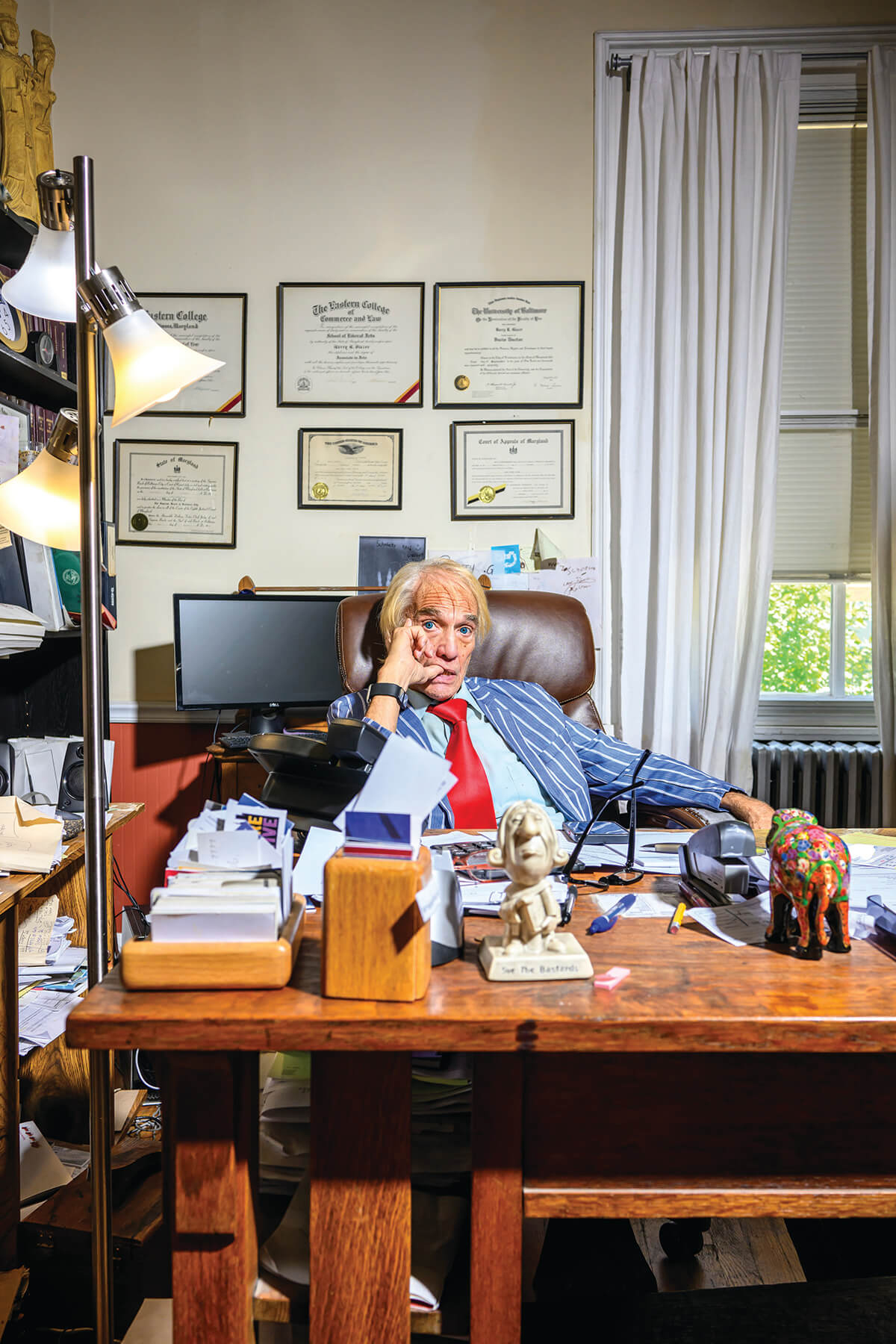
Glazer at his
desk in his sprawling Federal Hill law office.
Glazer, of course, cherishes his commercials, not to mention the recognition they bring on the streets of our fair city, where he gets asked to pose for selfies and gets his taglines shouted back at him. He does not try to hide the fact that he likes the attention. And yes, his first-time clients have seen them when they call about their various grievances: a workplace injury, an accident on a city bus, a complaint against a doctor, a food poisoning during a birthday party at a national pizza chain geared toward kids, or an only-in-Baltimore neighborhood gentrification beef over the right to feed pigeons. (They were defecating on a new apartment building.)
It’s worth noting that Glazer and his firm, which includes, as advertised, a medical doctor on staff, handles more than personal injury cases, though those remain their bread and butter. Family law, divorce, estate planning, workman’s comp, criminal, and general practice law are all part of the action. They even won a major settlement against the city after a man was wrongly convicted of murder and spent 10 years in prison.
Because he doesn’t specialize in criminal defense, Glazer hasn’t handled that many high-profile clients himself. His most famous opponent, however, may be former D.C. Mayor Marion Barry. That was a suit filed on behalf of a BWI airport employee, who claimed the former mayor pushed his way into a men’s bathroom she was cleaning to relieve himself.
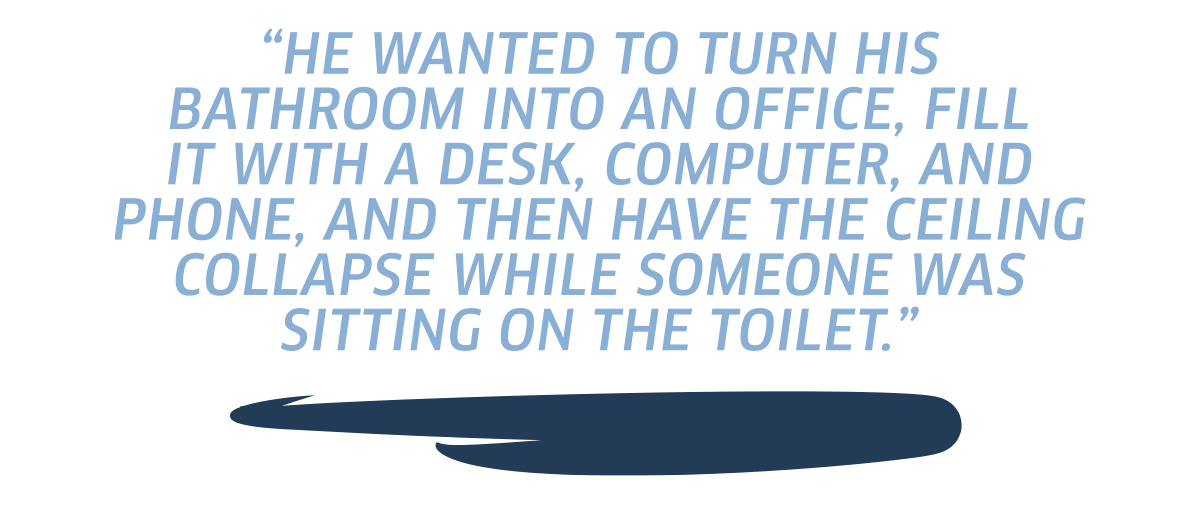
“I have more compassion for him now,” Glazer says with a shrug. “He was having prostate problems. I’m older. I can relate.”
But his law firm, which may be juggling 100 cases at any one time, isn’t enough to keep him from getting restless. He has always had a lot of irons in the fire. He opened Joe’s Organic Bar in the 1970s in Federal Hill—where The 8x10 sits now—just when the neighborhood’s bar scene started kicking off. The health food angle proved a bust, but the pool room and live music attracted a lively crowd. Guitarist and Peabody grad Michael Hedges, who later won a Grammy, was a regular performer. “I sold it because I was drinking every night,” says Glazer, who nonetheless has fond memories of the place. “What else are you going to do when you own a bar?” He traded his bar license for a real estate broker’s license and today maintains properties in Baltimore, Miami, and at the Jersey Shore.
Along with the vet hospital and pet facilities, he owns a Baltimore County horse farm, which he’d like to convert into an animal sanctuary. He owns land in Salisbury, with longtime business partner (and long-ago girlfriend) Gina Gargeu, that they plan to develop into a full-amenity campground. He also wants to open, and this would certainly be novel, a vegetarian Italian deli in Pigtown.
All that said, he enjoys making his commercials so much I had to ask if he thought maybe he’d missed his calling. Does he ever wonder if he should've skipped law school and gone into the TV-ad business?
“I don’t think I could make commercials for someone else,” he says, giving the question consideration over a buffet Indian lunch at a restaurant near his office. “These are my vision. I write them. I control everything from start to finish. I’m not good at taking orders,” he continues, in his nasally, unmistakably authentic Bawlmer accent. “I do think I’m good at getting a message across in 30 seconds that is memorable and not boring, which is not as easy as it looks. That no one has ever approached me to make commercials for them,” he adds, without a trace of irony, “that surprises me.”
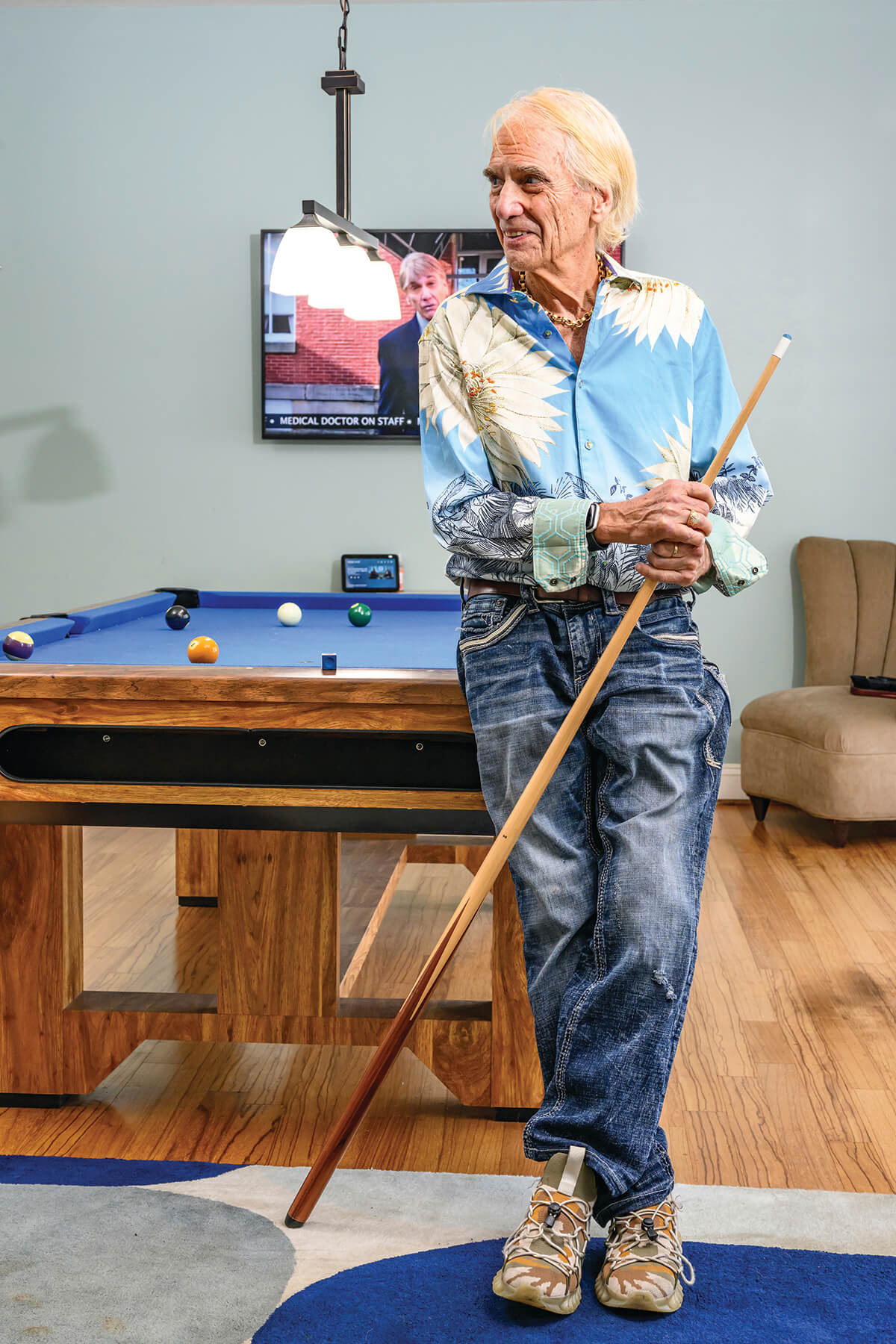
Shooting pool in
his Canton TV and
game room.
In terms of earning the city’s embrace, Glazer has come a long way since a Sun columnist sniffed that his commercials were so patently offensive that they made him wish lawyers had never won the right to advertise on television.
Quirky TV pitchmen like “Mr. Ray” of Mr. Ray’s Hair Weave and Dick Sammis, the jocular car dealer known as “Mr. Nobody,” were always beloved on some level by most Baltimoreans, but lawyers not so much after the Supreme Court granted them access to the antennas atop our rowhouses in 1977. The pharmaceutical industry began advertising five years later and their commercials and lobbying, perhaps ironically, has been fodder for Glazer ever since.
Even mild-mannered Stephen L. Miles, a former assistant state’s attorney, was lambasted in the 1980s over his low-key commercials and tame catchphrase, “Let's talk about it.” The attacks proved so unrelenting that Miles took to the University of Baltimore Law Forum journal to defend attorney advertising.
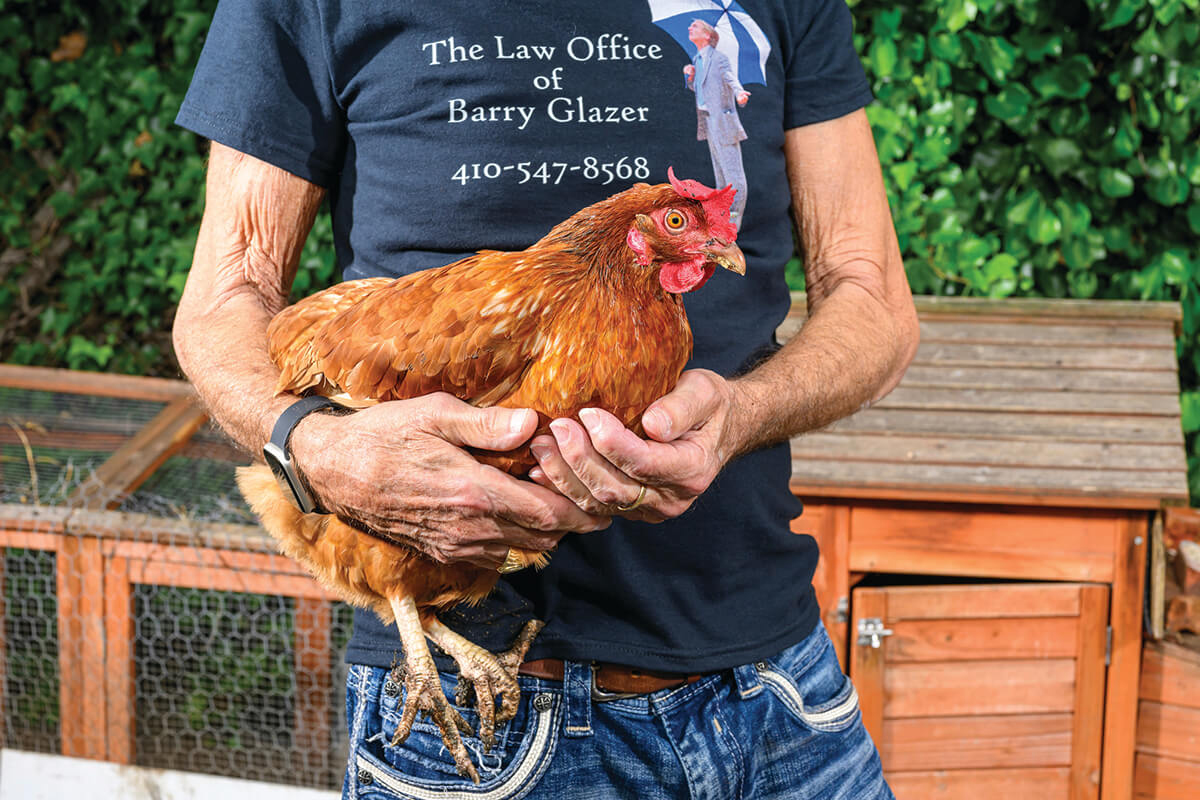
holding a pet chicken in his office courtyard.
Glazer remained unbothered by the uproar. The bumpy road that led to his current success—degrees from the not-quite-Harvard Eastern College and Mount Vernon School of Law, both now extinct, a car crash at 19 that left him with a permanent limp, and the four attempts to pass the bar only made him more determined to make his own way in the buttoned-up legal world. When he says in his ads that he came from nothing and is a “legal advocate for the injured, disabled, and urinated upon”—it’s coarse, but legit.
The Mount Vernon School of Law, subsumed by the University of Baltimore in 1975, wasn’t quite the fictional correspondence-based University of American Samoa Law School of Saul Goodman/Better Call Saul notoriety, but not far off, according to Glazer. “I'm happy they existed because no other school would've taken me in,” he says, turning around in his desk chair and gesturing to the framed diplomas behind him. “Maybe 10-15 percent passed the bar, but they gave you a chance and let you try.”
One of his fellow Mt. Vernon night school graduates was another one-time working-class personal-injury and medical malpractice lawyer who built a class-action empire around asbestos lawsuits and made enough money to buy the Baltimore Orioles. Yup, Peter Angelos. “The University of Baltimore claims him and it’s in some of his bios,” Glazer says. “But that’s where he went.” (Notably, U of B’s law center is named after Angelos’ immigrant parents.)
But Glazer has never pretended to be something he’s not, and his journey from goofy TV-advertising infamy to local icon got a major boost with the launch of the aforementioned neo-noir legal crime drama/black comedy, Better Call Saul, about a rough-around-the- edges, side-hustling, TV-advertising attorney, who brazenly breaks the law. Reddit users and YouTube commenters picked up on the similarities—the street smarts, the rascally personalities, the colorful wardrobe, and the self-promoting proclivities of the two characters. Both also have significantly older brothers who were respected attorneys, whose footsteps they followed into the legal game and initially worked for.
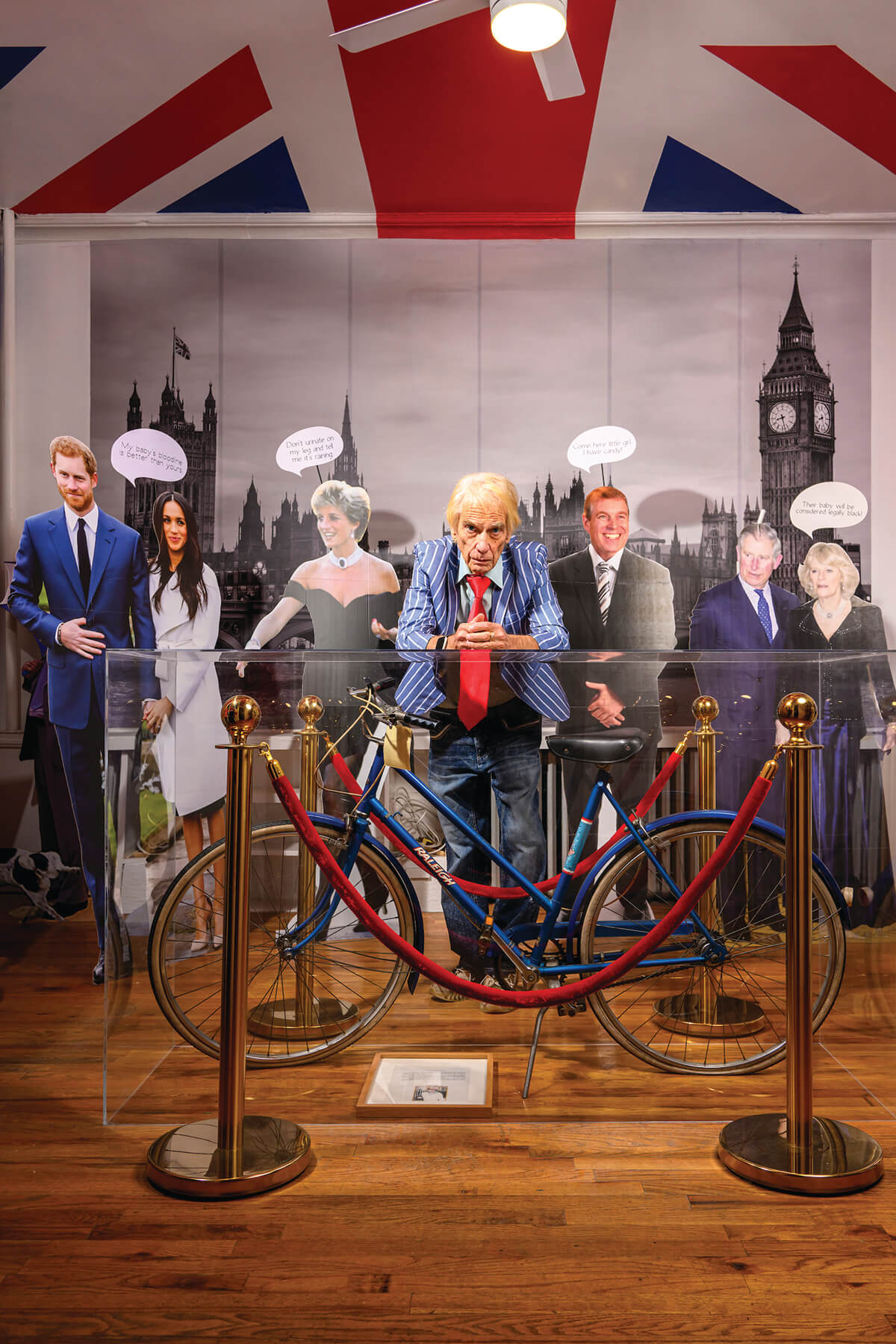
Glazer in his office’s anti-British royalty “museum” with Princess Diana’s bicycle.
Two major differences: Glazer’s desire to make money and stand apart from the crowd is not a matter of sibling rivalry, but related to his father, a man of middle-class means, who equated wealth not just with success, but smarts. And while Glazer has been a criminal attorney, he is not a criminal attorney.
Some claim Glazer’s commercials may have inspired the Better Call Saul protagonist, a rumor he doesn’t discourage. In truth, lawyers making over-the-top commercials are not in short supply. (Glazer’s ads rank seventh-worst in one national poll.) The whole comparison thing became a little meta when Glazer began airing his “Don’t Urinate on Me” ads (which you could easily imagine Saul Goodman saying in his commercials) during the acclaimed show.
If there was any doubt about his status in Charm City, the question officially closed three years ago, when artist Juliet Ames paid homage to Glazer by painting his visage and catchphrase on one of the DPW salt boxes—part of her project honoring city legends.

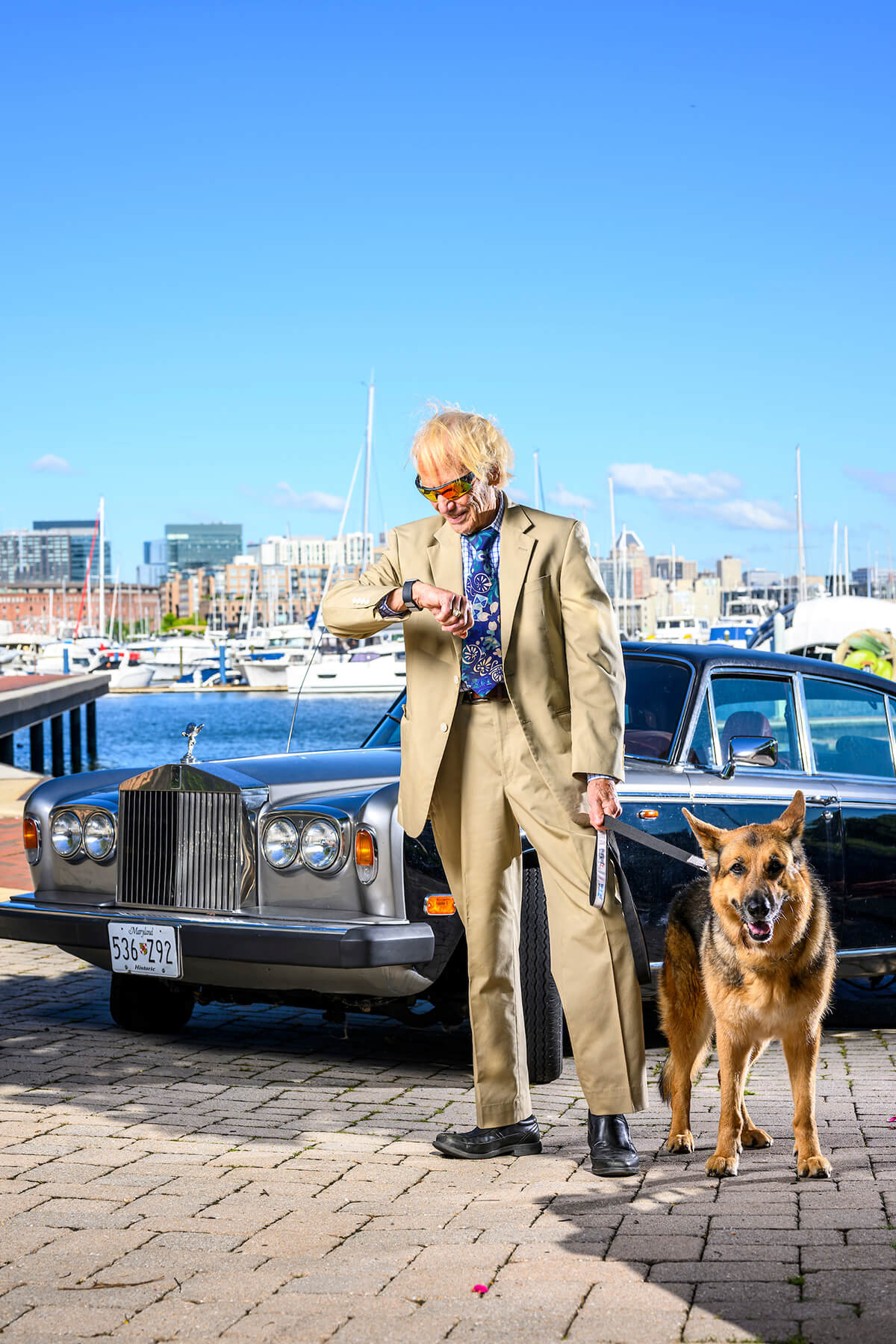
“If you go through all of my commercials,” says Glazer, who is not a self-reflective individual by nature, but driven by more material and base desires, “you’d get a really good insight into [who] I am and how I react. And what I’m all about.”
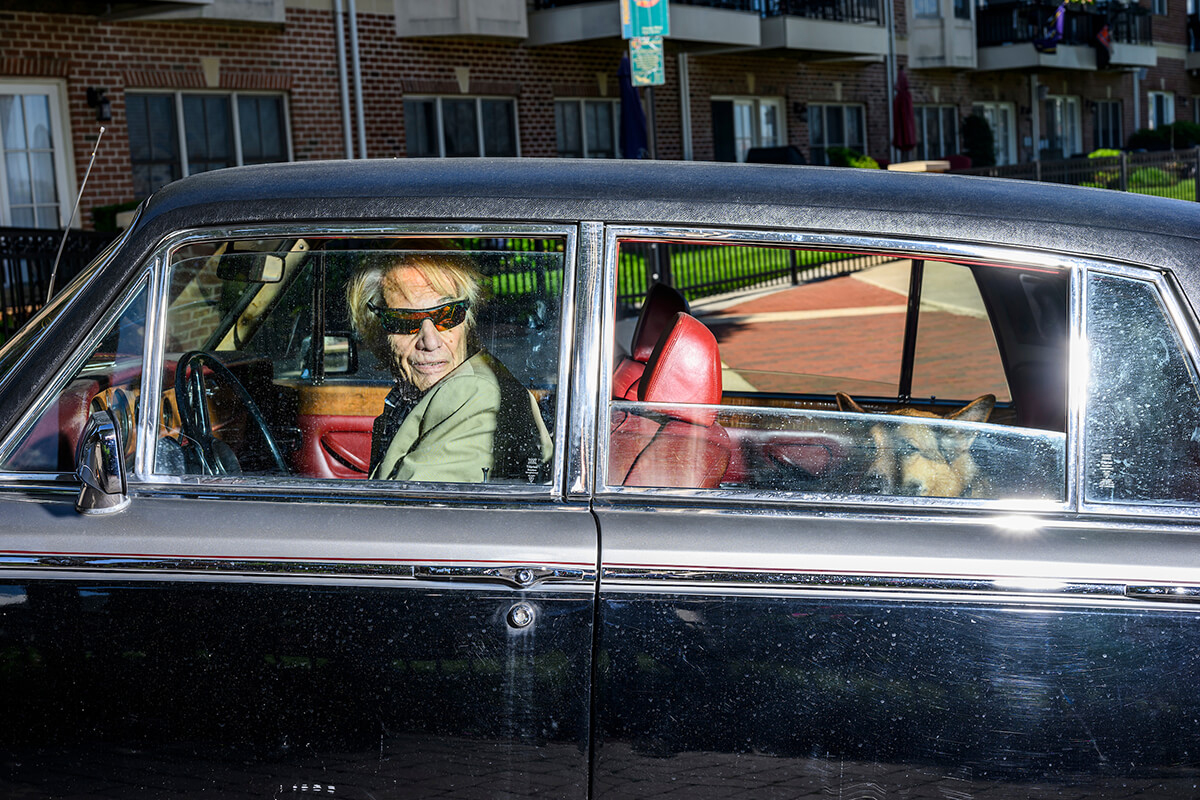
Earl Ingram, a retired civil engineer who grew up in the same neighborhood and has known Glazer since he was 14, says it’s true. “The Barry you see on TV is who he is,” says Ingram. Just with the volume turned up to eleven. “We got into minor scrapes together. Nothing major, ‘boys will be boys stuff,’ paying someone to buy us liquor when we were underage, trying to meet girls—that was Barry,” Ingram says. “The neighborhood was changing when we were teenagers. Barry was a guy who had your back if something got started or there was a fight. He was someone you could count on.”
The ads, for those who do not watch much television (or are unfamiliar with the “Awesomely Bad Local Lawyer TV Commercials” list), are not just where his unique sense of injustice and profit intersect. Glazer also shares his personal, political, and cultural takes. It’s a wild mix. In one, he mockingly imitates the ad of a rival firm that he claims was stealing his attorneys. In another quickly pulled ad, he said Angelina Jolie should have breastfed her twins if she wanted to avoid breast cancer. (His point was that breastfeeding has been shown to lower the risk of cancer, but Jolie did breastfeed her twins, and it’s a misguided comment for many reasons, including her family history.)
In another ad, after New England Patriots owner Robert Kraft was caught up in a massage parlor sting in 2019, Glazer made his case for legalized prostitution, a cause he has long touted.
“Prostitution is something I’ve talked to [City State’s Attorney Ivan] Bates about. I've always been intrigued by ‘The Block.’ I think they should move the police station away and make it like Las Vegas, with nude dancing and big clubs. It used to be a big draw. Control it, license it, but build [the prostitution] up. Women should have control of their body. It’s an antiquated law. It makes no sense.”
A pot smoker since he was teenager, he has also railed against the pharmaceutical industry’s lobbying efforts to block legalization.
He’s normally not inclined to advertise his partisan politics, but suffice to say he despises former President Trump and his authoritarian antics. Which is not to say he doesn’t appreciate the effectiveness of the former president’s crude performance art.
Locally, he did not want to reveal whom he backed in the contentious Democratic primary for mayor. But then Baltimore Banner reporter Justin Fenton revealed Glazer had contributed $1,500 to Mayor Brandon Scott’s reelection campaign. Supporting former Mayor Sheila Dixon, who was convicted of using gift cards intended for disadvantaged children, was an ethical bridge too far.
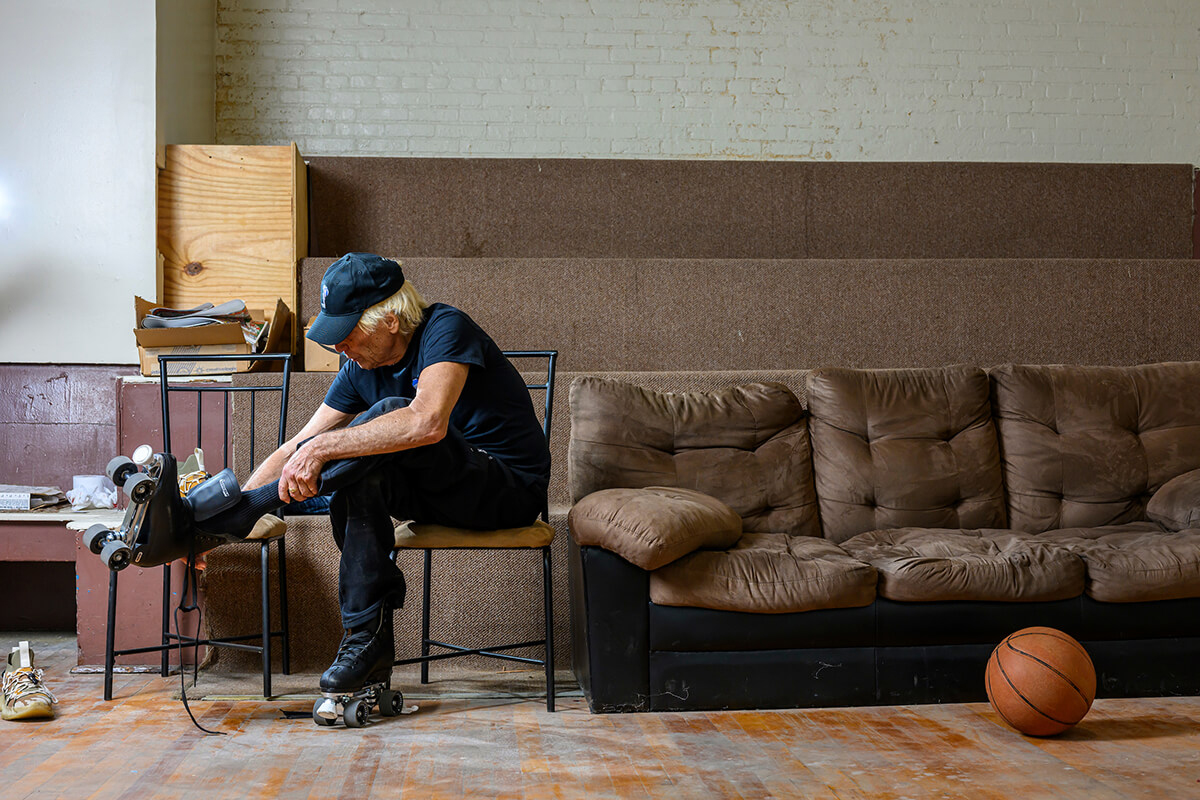
There are things about Glazer that you don’t learn in his ads, however. Some good. Some, well, interesting. Like his devotion to dating apps and the sugar-daddy scene since his divorce several years ago. He doesn’t want to say how many relationships with young women he’s currently juggling, here and in Miami, where he maintains a beach condo, but in both cities it's a “crooked number,” as they say in baseball (meaning two or more).
At first, he did not want to reveal his age on his profiles, but when dating apps posted his age behind his back, “All of a sudden these young girls are sending me messages that they match up with me,” he says, shaking his head. “At this stage, it’s actually a plus. I don’t know. Maybe they think they'll marry me and I'll die soon. But, the other thing is, I can afford to give them the kind of things that they are looking for...so, it’s a good time for me.”
Jokes aside, that he still has an abiding interest in sex surprises him as his eighth decade nears. (In a brief Q&A with this magazine in 2011, he named ex-porn star Ron Jeremy as the best person to play him in a biopic. He now admits, with a self-deprecating laugh, Jeremy may be “over” qualified in terms of physical endowments.)
For most of his life, Glazer believed he’d never settle down and and marry. But by the time he became a father for the first time at 64 and then again at 67, he thought his wild oats had been sowed.
His boys, and he is a caring and devoted dad by all indications, have widened his perspective on life, however. There are photos of them all over his office and home, and their bicycles and skateboards are in his garage.
“Having children makes no logical sense,” he says, a reference to the loss of time and money, and in his case the crimping of hedonistic tendencies. “I just had no idea how kids change you. This love that you have for them—to me, that was unexpected, I guess I’d say. All of a sudden, they are the most important things in the world to you.”
They’ve also helped keep him young. He listens to the same music they do. In many ways, you can’t help but admire the guy’s drive and stamina. He’s older than Trump and almost as old as President Biden, and as sharp and as focused on the future as ever, after bouncing back from a serious bout of pneumonia last year. The health and exercise routines have clearly paid dividends.
Glazer shows up in the office every day. He has no plans to retire or, heaven help us, step aside from his television career.
“He’s from the generation of lawyers that live to work, part of them becomes the job,” says attorney Robert Joyce, an associate in Glazer's office. “I had another boss like that, too, maybe a little younger. That generation is dying off. My generation, we work to live.”
On cue, as we were shooting the opening spread for this story with his historic Rolls Royce, three women walked past and recognized him, waving and saying hello.
“You’re the attorney with the television ads,” one said, smiling. “I know you.”
Glazer nodded humbly. “That’s me.”
After we wrapped, I said it must feel good to get recognized so often.
“I’d like to be recognized more, if I’m being honest,” he responded with a grin.
